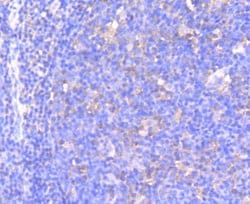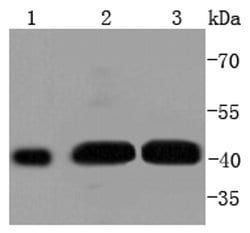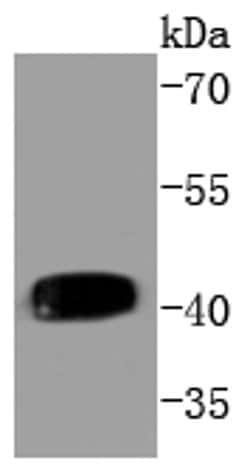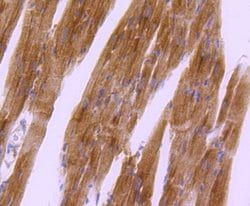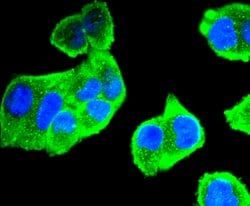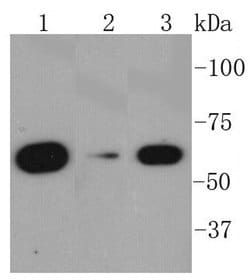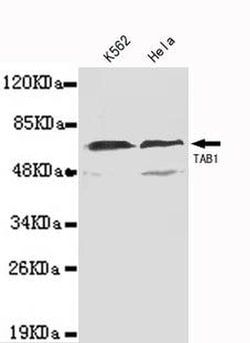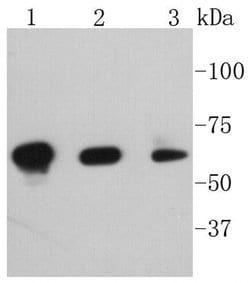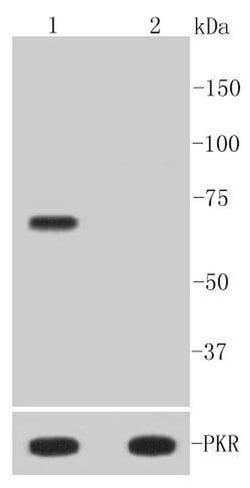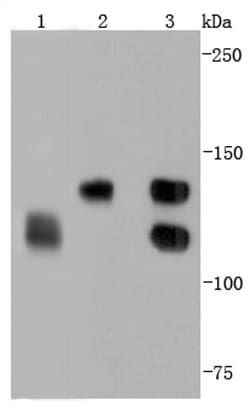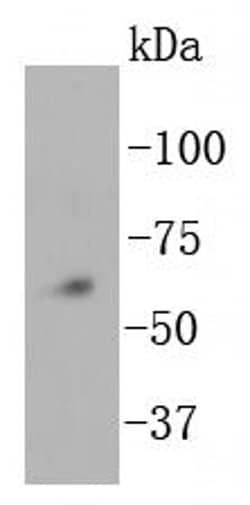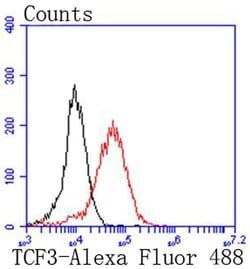Phospho-PKR (Thr446) Recombinant Rabbit Monoclonal Antibody (SY230), Invitrogen™
Manufacturer: Thermo Scientific
Select a Size
| Pack Size | SKU | Availability | Price |
|---|---|---|---|
| Each of 1 | PIMA532086-Each-of-1 | In Stock | ₹ 47,481.50 |
PIMA532086 - Each of 1
In Stock
Quantity
1
Base Price: ₹ 47,481.50
GST (18%): ₹ 8,546.67
Total Price: ₹ 56,028.17
Antigen
Phospho-PKR (Thr446)
Classification
Monoclonal
Concentration
1 mg/mL
Formulation
TBS with 0.05% BSA, 40% Glycerol and 0.05% sodium azide, pH 7.4
Gene Accession No.
P19525
Gene Symbols
EIF2AK2
Immunogen
Synthetic phospho-peptide corresponding to residues surrounding Thr446 of Human PKR aa 421-470
Quantity
100 μL
Primary or Secondary
Primary
Target Species
Human
Product Type
Antibody
Isotype
IgG
Applications
Immunohistochemistry, Western Blot
Clone
SY230
Conjugate
Unconjugated
Gene
EIF2AK2
Gene Alias
2310047A08Rik, 4732414G15Rik, AI467567, AI747578, double stranded RNA activated protein kinase, dsRNA-activated kinase, EC 2.7.11.1, eIF-2 alpha, eIF2a Kinase, eIF-2A protein kinase 2, EIF2AK1, EIF2AK2, eukaryotic translation initiation factor 2 alpha kinase 2, eukaryotic translation initiation factor 2-alpha kinase 2, IFN- type I-induced and dsRNA-activated kinase, IFN-induced and double-stranded RNA-activated kinase, interferon-induced, double-stranded RNA-activated protein kinase, interferon-inducible elF2alpha kinase, interferon-inducible RNA-dependent protein kinase, MGC126524, OTTHUMP00000201320, P1/eIF-2A protein kinase, p68 kinase, PKR, PPP1R83, Prkr, protein kinase R, protein kinase RNA-activated, protein kinase, interferon inducible double stranded RNA dependent, Protein kinase, interferon-inducible double stranded RNA dependent, protein phosphatase 1, regulatory subunit 83, serine/threonine-protein kinase TIK, T-cell viral integration site, Tik, Tyrosine-protein kinase EIF2AK2
Host Species
Rabbit
Purification Method
Protein A
Regulatory Status
RUO
Gene ID (Entrez)
5610
Content And Storage
Store at 4°C short term. For long term storage, store at -20°C, avoiding freeze/thaw cycles.
Form
Liquid
Description
- Recombinant rabbit monoclonal antibodies are produced using in vitro expression systems
- The expression systems are developed by cloning in the specific antibody DNA sequences from immunoreactive rabbits
- Then, individual clones are screened to select the best candidates for production
- The advantages of using recombinant rabbit monoclonal antibodies include: better specificity and sensitivity, lot-to-lot consistency, animal origin-free formulations, and broader immunoreactivity to diverse targets due to larger rabbit immune repertoire
- EIF2AK2 (PKR) is one of 4 kinases that specifically phosphorylate Ser51 of translation initiation factor eIF2-alpha in response to various environmental stresses
- EIF2AK2 plays a key role in antiviral defense mediated through its direct activation by double-stranded RNA produced by viral infection
- PKR plays a key role in IFN induced-innate antiviral response, virus-induced apoptosis, cell growth & differentiation
- PKR induces apoptosis by up-regulating Fas expression and mediates FADD/Caspase-8 death signaling pathway
- Upon viral infection, it functions as a dual protein, sequentially activating both cell survival & cell death pathways using kinase independent and dependent strategies
- PRKR regulates multiple pathways which include NF-kappaB activation, p53, p38, & PDGF signaling pathway
- PKR has been implicated in tumor suppression & malignancy
- To evade the antiviral effects of PKR, viruses have evolved multiple mechanisms, such as the inhibition of PKR by the non-structural protein (NS1) of the influenza virus
- More recently, PKR has been implicated in several neurodegenerative diseases including Alzheimer, Huntington, and amyotrophic lateral sclerosis.
